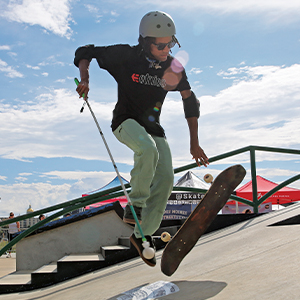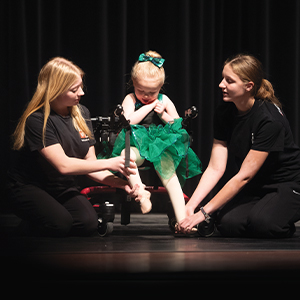Some athletes travel over an hour and a half away to play basketball with Adaptive Sports Iowa. Photo: Courtesy of Adaptive Sports Iowa
Writer: Brianne Sanchez
Dance classes. Skateboarding competitions. Wheelchair tennis. Kayaking on a lake. Iowans with disabilities enjoy more options to stay active than ever before, thanks to expanding programs and amenities for adaptive recreation.
Local parks departments and nonprofit groups are leveling the playing field for young people and adults whose physical or cognitive conditions limit their engagement in mainstream activities. For participants, physical activity for competition or just for fun can boost wellness and social cohesion.
At least part of the momentum for more accessible activities comes from the pandemic-prompted boom in outdoor recreation and the rising profile of Paralympic sports, according to Hannah Bowman, director of Adaptive Sports Iowa.
“Iowa still has some growing to do, but we are seeing successful programming in pockets,” she said. Her organization annually serves around 350 individuals with physical disabilities, through nearly a dozen programs such as competitive wheelchair sports and an adaptive team for the Register’s Annual Great Bicycle Ride Across Iowa, better known as RAGBRAI. “We have people driving from an hour and a half away just to go to a youth basketball practice.”
Daniel Van Sant, director of disability policy at the Harkin Institute for Public Policy and Citizen Engagement, is heartened by the recent wave of adaptive sports and recreation opportunities. But he also hopes people will advocate for even more options.
“Disability rights as a legally protected notion in our country is not very old,” he said. “We’re just now seeing the second or maybe third generation of people with disabilities who have access to or the right to full public life in the United States.”
He pointed out that if the 1990 Americans with Disabilities Act were a person, it would be a 34-year-old millennial. This generation is pursuing inclusive options that enhance the quality of life, in addition to the strides previous generations have made for access to necessities like education and employment.

Recent additions to Des Moines’ parks demonstrate how facilities can be more inclusive. At the world-class Lauridsen Skatepark, the Des Moines Streetstyle Open led by Skate DSM featured an adaptive skateboarding contest that included Dan Mancina, a globally recognized blind skater. He’s skated in several Des Moines events and hopes future contest organizers will solicit feedback from skaters, about what obstacles to use, for example, and what wayfinding markers would make the large park easier to navigate. Mancina advocates for 3D models, longer benches, tactile ground surfaces, obstacles with higher color contrasts, and auditory cues for echolocation.
“These help visually impaired skaters find obstacles,” he said. “It gives you time to orient yourself in time and space, and pop and do whatever you want to do.”
The Athene North Shore Recreation Area at Easter Lake earned accolades from disability advocates when it opened in spring 2024. Deemed the “most universally accessible park” in the country, the site’s features and rental equipment enable people of varying abilities to paddle, splash and cycle alongside one another.
“There are these wonderful opportunities designed [just for people with disabilities],” Van Sant said. “But what’s important is that they’re a way to get people off the sidelines and into the fabric of what recreation brings to our lives, into our community.”
CAN PLAY
Since 2012, Can Play has demonstrated how adapting a game’s pace, style and rules can empower people of all abilities to participate. Now, the nonprofit (formerly known as Courage League Sports) is expanding its impact by licensing its model across the Midwest and beyond.
Can Play’s tool kit gives community recreation programs plug-and-play solutions that cater to children with disabilities, autism or chronic health conditions. This is especially beneficial for small towns with volunteer-run initiatives.
“Our online portal helps train people coming into this space, and in turn, it’s bringing a more inclusive community,” said Tiffany Barlow, the nonprofit’s director of development and marketing.
Flat surfaces like indoor gymnasiums, Miracle League fields and futsal mini-pitches can be repurposed to host programs that extend the playing season for everybody.
“Our biggest goal is to give everybody the opportunity to play regardless of their abilities,” Barlow said. canplayadapted.org

DANCE WITHOUT LIMITS
Ann Ungs, a physical therapist at Blank Children’s Hospital, co-founded Dance Without Limits as a nonprofit dance and ballet program to help children and young adults with disabilities experience the joy of dance. Every spring and fall, professional instructors lead weekly classes designed to suit individual participants, and volunteers provide movement support as needed, pictured above. The fall session culminates with an onstage performance. dancewithoutlimits.org
LINK ASSOCIATES’ THERAPEUTIC RECREATION PROGRAM
Therapeutic recreation programs for people with disabilities include group outings, community integration activities, fitness and health workshops, art activities and more over the course of three seasons: January-April, May-August and September-December. Participants in all of the current sports offerings (basketball, bocce, bowling, dance, flag football, snowshoeing, soccer, softball, swimming, track and field, and volleyball) can compete in the Special Olympics. linkassociates.org
INDIGO EKHARDT
Indigo Ekhardt reached toward the rafters in a dance choreographed to “Defying Gravity,” the uplifting anthem from “Wicked.” She leaped and twirled across the stage with other Dance Without Limits participants and volunteers, in a recital that showcased dozens of dancers with disabilities.
Now 19, Ekhardt began dancing as a toddler, with a walker, shortly after she was diagnosed with a rare genetic disorder known as GLUT1 deficiency syndrome (short for glucose transporter type 1), which affects the nervous system and limits intellectual functions. She started dance classes at the invitation of her physical therapist, Ann Ungs, who co-founded Dance Without Limits.
“There are dancers with autism, there are dancers with significant cognitive delays, there are dancers with just physical issues,” said Ekhardt’s father, Bill, who eventually joined the organization’s board. “There’s the whole spectrum, and it seems like everyone who is able to behaviorally be present has been accepted.”
The program’s one-on-one support helped Ekhardt get stronger and build relationships, all while having a good time. “Being a dancer helps me do a bunch of different things,” she said. “I have made friends throughout the program.”
Bonding with volunteers, including one who went on to perform on Broadway, adds extra meaning to the movement. Developing trust and collaboration are core to the program.
Ekhardt’s dad said that, from the very beginning, she “had people who were with her, helping her dance, helping her move, so that she was doing the ballet to the best of her ability.”
PATRICK STANGL
After his doctor suggested he needed to try to become more social, Patrick Stangl and his sister started looking for options. Growing up, health challenges prevented him from participating in sports. At 46, he is still battling complications from a brain injury he sustained as a toddler.
Stangl eventually enrolled in exercise classes and team sports through Link Associates’ Therapeutic Recreation Program, where he discovered his love for bocce. “The rules are simple,” he said. “There’s not much thought into the game as long as you control how much speed you put on the ball.”
His team trains for eight weeks before the Special Olympics every summer in Ames. He’s served as captain and has brought home gold three years in a row. Camaraderie is part of the fun.
“I’ve worked with several coaches in the last couple of years,” he said. “We go to dinner and to different events, like day trips to different places around Iowa.”












Show Comments (0)